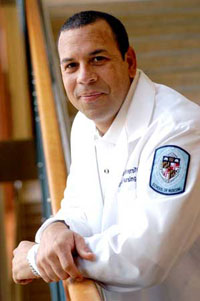By Luis D’Andrade
Last November I got the phone call that changed my life.
My wife Laura Kessler and I were living in Portland, Oregon, at the time. I was working with the YMCA, helping to manage a school literacy program, and I was on the waiting list for the 13-month accelerated program at the Johns Hopkins School of Nursing that was scheduled to begin in June.
Then on that wet November day I received an unexpected call from the admissions office at Hopkins. “We are launching a new 17-month accelerated program in January to help meet the nursing shortage,” Sylvia Lee, the admissions records coordinator, told me. “Would you be interested?”
Would I! Unfortunately, we had just one month to give notice on our jobs, pack up all of our belongings, rent a house over the Internet, and then head across country in our car, made crowded by the presence of our 160-pound mastiff, Calypso, and cat, Macey. But we did it. And our drive through the southern United States was absolutely beautiful.
Almost immediately after we arrived, classes started. The first couple of weeks were quite difficult for me. English is not my native language—I was born and raised in the Dominican Republic—and the language difficulties coupled with the intensity of the coursework made my transition very challenging. All of this was compounded by the stress of having made such a big move so quickly. But I loved it!
I never expected the level of professionalism that I found among the 46 other students in my class. They are all extremely well prepared. Most, like me, have made career changes to be here, and there’s a high level of maturity. It didn’t take long at all for us to begin to feel like one big family. Because our 17-month class is so small, there’s been a lot of bonding, both with each other and with our instructors, who have given us a lot of their time. The environment at the school is exciting and positive. That’s because we all know what we want to do: become great nurses. And we are doing just that.
In my studies, I’m learning to focus on critical thinking. I’ve come to realize that my studies are not just geared toward a board exam or a GPA; I am gaining knowledge for life—to care for people and promote health. It’s a great responsibility.
After graduation, I would like to pursue clinical work in geriatric pain management and serve on the faculty of a nursing school here in the United States. Once I have some significant experience, I’d like to return to the Dominican Republic and open a clinic to provide much-needed health care to poorer communities.
Most people back home really don’t have an idea of the level of nursing work available in the United States. Nursing is not seen as a highly skilled profession there. I’d like to help change that attitude by bringing the evidence-based nursing practice and critical thinking I’ve learned at Johns Hopkins back to the Dominican Republic.
